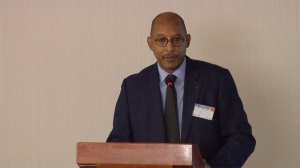There are three key challenges impeding infrastructure development and economic growth in Africa, including government policies, the continent’s position on global competitiveness and a high level of youth unemployment.
At the second Public–Private Dialogue Forum on Infrastructure Projects in Johannesburg, New Partnership for Africa's Development (Nepad) Planning and Coordinating Agency CEO Ibrahim Mayaki highlighted that 75% of people in the Southern African Development Community were under 25, with many unemployed.
“If we don’t solve this youth unemployment issue, anything that we do will fail and Africa faces the risk of being remarginalised again,” he warned.
“With the end of the fantastic commodities boom cycle, [and it being] a long time before we notice another type of boom in terms of raw materials and prices getting to a certain level, it creates very serious challenges,” he noted.
Further, Mayaki said these challenges could be overcome if the private sector played an active role in the development of economies and if it became involved in infrastructure projects at the early project preparation phase.
“We need a dialogue on the continent, [otherwise] we will not be able to construct the necessary public–private partnerships (PPPs), solve issues relating to transboundary projects [or be] conducive to private sector investment,” he stated.
REGIONAL INTEGRATION
Mayaki grouped Africa into four categories. “There is the Africa that has succeeded in diversifying its economy; there is the Africa of raw materials, which has tried to diversify to a certain point – this excludes South Africa, Egypt and Nigeria; there is the Africa that is composed of the least-developed countries, which is struggling to get to the door that would lead to diversification of its economy and there is the conflict-ridden Africa, such as Somalia.”
“Africa will not be able to develop if the problems facing [certain countries] are not solved. This could only happen through regional integration,” he noted.
Further, Nepad Business Foundation (NBF) chairperson Stanley Subramoney identified inter-Africa trade as the single greatest stumbling block for continued growth and global competitiveness.
He pointed out that, over the past 15 years, Africa had been on a continued growth path and it was one of the fastest-growing regions in the world; however, $93-billion was still needed for the development of transport, energy and information and communications technology infrastructure.
He added that there was a further financial deficit of about $31-billion. “To close this funding gap, Africa requires a multistakeholder approach to develop and design innovative PPPs.”
Through the NBF Africa Infrastructure Desk (Afri-ID) – a multistakeholder platform unifying public and private sectors and finance agencies – the three major rail corridors on the continent would remain a significant focus over the years to come, amid the continent’s ambitions to increase trade.
“We need to improve intra-Africa trade from a mere 15%. As Africans, we do not trade among ourselves. The majority of freight moves on the [already strained] road networks owing to inefficiencies in alternative transport infrastructure.
“Developing effective and competitive transport solutions will and must lower the cost of doing business across the continent,” Subramoney added.
Mayaki noted that, through corridor development, intra-Africa trade could be increased to 25%.
EMAIL THIS ARTICLE SAVE THIS ARTICLE
To subscribe email subscriptions@creamermedia.co.za or click here
To advertise email advertising@creamermedia.co.za or click here












